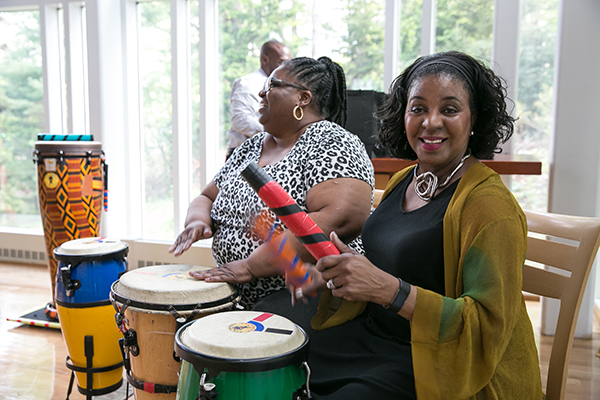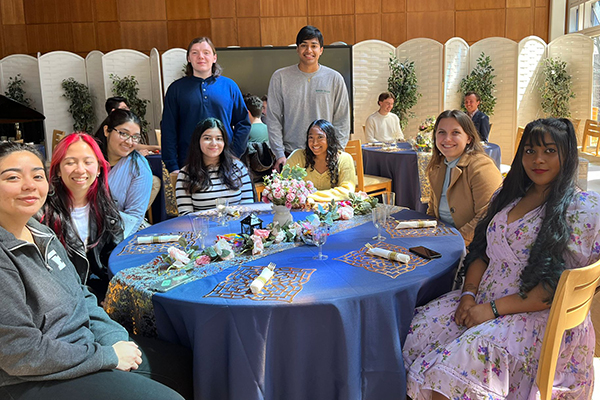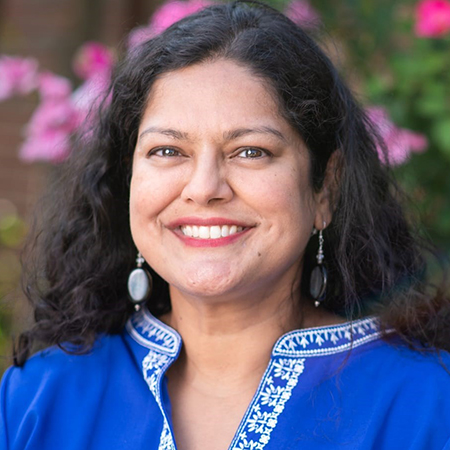




The Office of Belonging and Inclusion
The Office of Belonging and Inclusion is dedicated to empowering a diverse and inclusive campus community by nurturing a culture where each student experiences a deep sense of belonging and acceptance.
We aim to create a campus environment that prioritizes justice, well-being, diverse worldviews, and inclusive perspectives. Acknowledging the inherent dignity of everyone and the systemic obstacles to equitable learning and living spaces, we actively elevate and assist historically marginalized and underrepresented groups, ensuring everyone's success at Babson and beyond.


Grounded in empathy, respect, and intersectionality, we offer programs that celebrate their cultural and religious identities, build intercultural and interfaith connections, and collaboration across diverse backgrounds.
We are located in the Glavin Chapel and the Diversity Suite in Park Manor Central.


The Office of Belonging and Inclusion is a new department within Student Affairs. It is the outcome of merging The Office of Religious and Spiritual Life and Multicultural Identity Programs.
Meet the Staff

Denicia Ratley
Senior Director of Belonging and Inclusion & College Chaplain
dratley@babson.edu
781-239-5969
Glavin Family Chapel, Room 101
Denicia serves as the Senior Director of Belonging and Inclusion & College Chaplain, a newly established office that merges Religious Life and Multicultural and Identity programs. In this role, Denicia provides leadership, strategic direction, and oversight for integrating multicultural identity programs and spiritual life initiatives. Her work is dedicated to fostering a more inclusive and equitable campus environment, promoting students’ growth, diverse community engagement, and a culture of belonging and well-being for both undergraduate and graduate students.
With a strong commitment to diversity, equity, and inclusion and her deep understanding of the complexities of cultural identity and spiritual life, Denicia brings a wealth of experience to this role and is evident in her work with facilitation of challenging conversations and her leadership of campus.
She has a proven track record of creating inclusive spaces that promote spiritual growth, cultural exploration, and social connectedness. Her passion for social justice and her ability to build bridges across diverse communities and her ability to navigate complex situations with empathy and resilience has been invaluable in fostering a sense of belonging and well-being among students.
Previously, Denicia was the Director of Religious & Spiritual Life at Babson College, where she supported a diverse range religious and spiritual communities on campus, oversaw a team of Chaplains, and spearheaded initiatives to promote interfaith dialogue, religious understanding and cross-cultural exchange.
Denicia holds a BA in Human Development and Family Studies with a minor in African American Studies from the University of North Carolina at Greensboro, two master’s degrees from Gordon Conwell Theological Seminary; MA World Missions, Cross Cultural Counseling and MA Theology, Ethics. In her spare time, she enjoys listening to jazz, attending plays at local theaters and helping women find the voices apart from patriarchal influence as well as build confidence in themselves by deconstructing beauty standards and apprehensions around makeup and natural hair.

EriKa Monfort
Associate Director of Belonging, Inclusion, and Cultural Life
emonfort@babson.edu
781-239-4027
Pronouns: she, they
EriKa Monfort serves as the Associate Director for Cultural Life within the Office of Belonging and Inclusion. As an Afro-Caribbean, Diversity, Equity, and Inclusion Practitioner, who is neurodivergent, EriKa’s declaration is not only to, engage in the ongoing work to dismantle racism and redesign systems, contribute to the advancement of educational equity and justice, but to also continue to spread a deeper understanding of process and practice from an equity perspective, and the importance of equity-minded leaders.
EriKa’s career spans over eight years of progressively increasing responsibilities within higher education, specifically within Student Affairs. With each position helping to create structures and processes that both seize on opportunities and address the challenges inherent in a culturally and functionally diverse organization.
EriKa is currently completing her Ph.D in Educational and Organizational Leadership and Policy Studies at Springfield College. She is most excited about more exposure to (1) historical context, (2) the variety of critical theoretical lenses and their purpose, framework, and legacy, and (3) the opportunity to examine/connect these theoretical lenses to current systems, and practices within U.S. public and private education.
Fun Fact: (1) EriKa doesn't drink juice, and can only really tolerate a glass of OJ. (2) In 2013, EriKa was crowned Bridgewater State University’s Homecoming Queen. And is the last Queen of Bridgewater State University as they transitioned from using traditional titles.

Preeta Banerjee, PhD
Associate Director of Belonging, Inclusion, and Spiritual Life
pbanerjee@babson.edu
781-239-4130
Pronouns: she, her, hers
Preeta Banerjee, PhD has dedicated her life and career to bringing together spirituality, community, innovation and entrepreneurship. She draws on over 25 years experience as a business school professor, corporate executive, life coach and higher education chaplain.
Previously, she built intentional and inclusive communities at Tufts University as an inaugural Hindu Chaplain; Harvard Divinity School as a meaning-making facilitator; the BTS Center as an eco-spiritual circle leader; and MIT as an ORSEL fellow supporting interfaith dialogue.
Preeta has a PhD in Strategic Management from the Wharton School; a BS in Computational Biology and Business from Carnegie Mellon; Graduate Certificate in Interreligious Studies from Hartford International University for Religion and Peace; and CPE I and II with Sankofa CPE.
She has also been honored as a finalist for Aspen Institute’s Rising Star; a Fulbright-Nehru Senior Scholar, and Boston Business Journal’s 40-under-40.

Brooklyn Modestita
Assistant Director of LGBTQ+ Identity Programs
bmodestita@babson.edu
781-239-4362
Pronouns: she, her, hers
Brooklyn Modestita is a Puerto Rican Trans Woman and the Assistant Director of LGBTQ+ and Identity Programs. She has a background in DEI, Facilitation, and Training. Brooklyn’s passion is making sure everything she does is guided by an intersectional lens. She has a master’s degree in Gender Studies and Social Justice from McMaster University and a bachelor of arts degree in Women’s and Gender Studies, from West Virginia University.
Before coming to Babson Brooklyn was a co-coordinator of BIPOC Community Relations at the Transgender Media Lab. Brooklyn also was an independent contractor conducting cultural competency trainings for Non-Profit organizations. In her free time Brooklyn enjoys playing video games and watching anime.

Craig Marantz
Jewish Chaplain
cmarantz@babson.edu
781-239-5969
Glavin Family Chapel
Pronouns: he, him, his
Craig is so happy to join you in all the fun at Babson College and its Office for Religious and Spiritual Life. To serve a creative community of emerging adults and young entrepreneurs is truly a blessing—as is working alongside a very fine and attentive chaplain team.
A native of Los Angeles, Craig is married to Betsy, and they have two children, Cara and Jared, both in college, plus a fun pup named Zeus—who really wishes he was in college.
Craig counts it as one as his greatest joys to impact life as a rabbi—to serve God and people; to live, teach, and learn Torah; to grapple with faith; to bring healing to the world, to be a force for good. Craig is a kind, caring and flexible leader with 21st-century vision and a hearing, empathic heart. Over the years, he has implemented innovative approaches to participation, helping Jewish folks—together with their families, friends, and allies—in all sorts of varied pursuits: sacred community, prayer and ritual practice, lifelong learning, youth, teen & emerging adult engagement, social justice, shared leadership, and most recently, spiritual entrepreneurship.
Ordained in 1999 from Hebrew Union College-Jewish Institute of Religion in New York City, Craig also has a Master’s degree in Education from Stanford University and a Bachelor’s degree in History from UCLA.
Craig has served as a congregational rabbi, educator, and summer camp professional for over two decades. And, currently, in addition to his service at Babson, Craig is also the rabbi at Sha’arei Shalom in Ashland, MA and a Junior Varsity baseball coach at Brookline HS.

Darrell Hamilton
Protestant Chaplain
dhamilton@babson.edu
781-239-5969
Glavin Family Chapel
Darrell is an ordained Baptist minister. Darrell’s ministry is centered on advancing diversity, inclusion, and advocacy for the vulnerable and marginalized as aspects of the Christian tradition to inspire our world toward greater justice and love for all people. Darrell is a graduate from Wake Forest School of Divinity where he received his Masters in Divinity in 2017. Darrell also has an undergraduate degree in Political Science from the University of Central Oklahoma.
Darrell’s preaching, teaching, leadership, and community engagement is inspired by the principles and scholarship of James Cone, James Baldwin, Kelly Brown Douglas, and Jeremiah Wright, Jr., and the examples of Martin Luther King, Jr., William Barber, II, Otis Moss, III, and others. Darrell is the former Executive Minister for Operations and Resource Development at Middle Collegiate Church in New York. Prior he was the Pastor for Formation and Outreach at the First Baptist Church in Jamaica Plain, Program Director for City Mission Boston's Urban Pastoral Ministry Program, and held leadership positions with the Massachusetts Poor People’s Campaign: A National Call for Moral Revival. Darrell’s vision for ministry is to lead an intentional welcoming, affirming, and progressive Christian community, as he conspires to advance the economic, spiritual, and systemic liberation for all marginalized people.

Renee Leavitt OFS
Catholic Chaplain
rleavitt@babson.edu
781-239-5969
Glavin Family Chapel
Renee Leavitt OFS is an active member of the Catholic Church. She received her Master of Theology in Systematics from Boston College, her Master of Theological Studies from Boston University, and is a third order secular Franciscan (OFS). Renee is from Massachusetts and has a background in teaching theology to middle school and high school students. Renee has also been cantoring in the Catholic Church since 2011. She is pursuing yet another degree, at the Berklee College of Music, where she is working to create more Christian Worship Music.
Renee has a passion for the philosophical aspects of the church and life’s greatest questions. She looks to Aquinas, Schillebeeckx, and Augustine as key theologians that help the human mind to comprehend God’s relation to humankind.
Renee dedicates her time to helping others, making goodie bags to donate to food pantries, giving back to the church in her talents, and praying for those around her without asking for recognition or thanks. Renee models her life after St. Francis of Assisi, who was known as being the saint who lived closest to the life of Christ, giving even the crumbs that could satiate his starved-ness to others who may need them more.
She takes the following quote from Dorothee Sölle to be encapsulating of her praxis: “The dance of the love of God cannot be danced alone.”

MacKenzie Cochrane
Administrative Coordinator, Office of Belonging and Inclusion
mcochrane@babson.edu
781-239-4077
As Administrative Coordinator for the Office of Belonging and Inclusion, MacKenzie provides essential support to staff and operations across the department. With a background in education and non-profit family programming, she brings a strengths-based approach to organization, communication, and team coordination. Known for their calm presence and thoughtful facilitation, MacKenzie is often the first to offer clarity and perspective in moments of complexity.
MacKenzie’s experience working with children and families has shaped her belief in the inherent value of every individual. Her career in diverse educational and community settings has equipped them with a deep understanding of inclusion, equity, and the power of connection. At Babson, MacKenzie is committed to fostering a collaborative, kind, and organized environment that empowers staff and advances the mission of belonging and inclusion.
A Massachusetts native, MacKenzie holds a B.A. in Music Education from Providence College. She has taught in K–12 schools across Massachusetts and New Hampshire and developed youth programs for the Greater Burlington YMCA prior to joining Babson. Outside of work, MacKenzie enjoys music, poetry, practicing yoga, and spending time with friends and family along the East Coast.